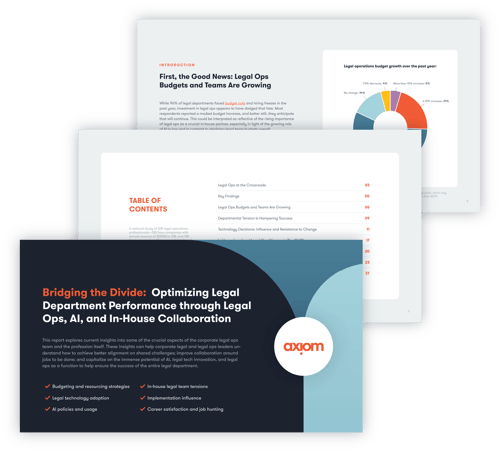Axiom Legal Operations Professional Implements Contract Lifecycle Management Tech for Clients
August 2024
By
Carolyn McNally

Attorney turned legal operations professional (LOP) Sharon provides insight on the transformative impact of AI, alleviating tensions between LOPs and in-house legal leadership, and how working for an alternative legal service provider (ALSP) allows her to be more involved with her community.

If Sharon could give every LOP one piece of advice toward implementing technology, it would be to “Listen first.” As a former in-house attorney who now specializes in implementing contract lifecycle management (CLM) technology, she has learned through experience the importance of getting buy-in from in-house leadership and aligning operational goals with shifting business priorities. She also emphasizes the importance of being succinct in communications with senior leadership. “It’s my job to go in and identify the pain points of all impacted stakeholders; identify overlap between functional teams, and place solving for those at the top of my list,” she explains.
Sharon is part of a growing group in the legal industry – legal operations professionals – whose job is, in part, to help innovate, automate, and otherwise create efficiencies within legal departments. Axiom’s recent study of 200 U.S. in-house legal operations teams conducted by Wakefield Research, Bridging the Divide: Optimizing Legal Department Performance through Legal Ops, AI, and In-House Collaboration, found 94% of respondents expect their legal operations department to grow in the next two years. The Association of Corporate Counsel found that the number of legal departments that employed at least one legal operations professional has nearly tripled over a six-year period.
But the role isn’t only growing in terms of numbers. It’s growing in significance, too, particularly as artificial intelligence becomes more widespread. As someone who has been both in-house counsel and LOPS, Sharon offers a unique, arguably much more holistic, view of the inner workings of a legal department.

“We have a huge advantage as in-house counsel and legal operations professionals. We see everything – not just the work of the different functional teams and business stakeholders, but redundancies, bottlenecks, duplication of efforts in their processes and procedures,” she shares. “So naturally, legal operations professionals are adept at breaking down barriers and fostering enhanced collaboration.” In Sharon’s realm, that often means the strategic adoption and implementation of specific CLM technologies.
From healthcare law to legal operations
After Sharon earned a dual Juris Doctor and Master of Arts in Health Administration, she began her career as a healthcare attorney. But when provider consolidations shook up the field, she found herself wanting better stability in her career and pivoted to healthcare real estate.
“I would help build the legal department,” Sharon explains. “But twice, the company I was working for sold, and it made me wonder what impact I was really having. Who am I really helping?” It was this question, and the ability to reflect on both her personal and professional goals during the pandemic, that pushed Sharon to make the move to legal operations: a position where she could better help the attorneys with whom she could empathize.
Maximizing impact and meeting client needs
Sharon emphasizes that for a legal operations professional to truly succeed, it’s crucial to allocate adequate time for key activities such as strategizing, testing, implementing, and gathering information. This investment of time is not just a luxury but a necessity for effective operations, and without it, the ability to fully understand and address the unique challenges faced by legal departments is significantly compromised.
“It’s not just about implementing solutions,” she says. “It’s about diving into the existing processes and discovering where efficiencies can be gained. You need to ask, ‘How can I streamline these processes? What administrative tasks can be automated to free attorneys up for the type of work requiring a law degree?'”
Navigating tension, power dynamics between legal operations professionals and the attorneys they empower to focus on high-value work
Axiom’s recent study of in-house legal operations teams also found artificial intelligence (AI) is fast becoming an integral part of the modern lawyer’s toolkit due to its potential to transform traditional workflows and enable legal professionals to focus on higher-value, strategic work and drive productivity. But it’s also become a source of tension among in-house and legal operations leaders.
For many, this tension has created a misalignment when it comes to the legal department’s goals and how its resources are allocated, with 41% of legal operations professionals indicating tension or conflicts often or always arise between the legal team and the legal operations team due to power dynamics or decision-making authority. Only 13% of legal operations professionals feel they play a crucial role in department decisions, while an overwhelming majority said the department’s in-house lawyers and paralegals are not completely open to making changes based on their feedback. In fact, the legal operations professionals surveyed noted difficult colleagues or office politics as their top reason for feeling stressed or burned out in their role.

Sharon can relate. “Office politics contribute to attrition, lower job satisfaction, and if unchecked, ultimately prevent the team from being as successful as possible,” she explains. She believes the tension often felt between in-house legal leaders and legal operations leaders stems from miscommunication or a lack of clearly identified and shared strategic framework within the department itself.
As with most LOPs, Sharon is driven by her desire to help her attorneys succeed. While she believes her law degree and background as an attorney have helped make in-house counsel more comfortable working with her, she strongly believes that LOPs without a law degree are equally impactful.
More Insights on Legal Operations
Explore more insights into the crucial aspects of the corporate legal ops team and the profession itself in our 2024 Legal Operations Survey Report.

How artificial intelligence is impacting the field of legal operations
Despite inherent frustration in implementing and adopting legal technologies, LOPs remain largely excited about the possibilities AI could afford their teams. Every single survey respondent (100%) said they plan to purchase or implement new legal technology within the next two years, with AI-infused tools among the top considerations. AI-powered virtual legal assistants and contract review technologies are at the top of their lists.
But the results of Axiom’s survey also demonstrate a major issue when it comes to the implementation of AI in legal departments: nearly all, or 99%, of respondents report barriers that prevent them from adopting more AI tools and techniques within their departments. A substantial 58% of respondents pointed to a lack of team leadership’s buy-in or team resistance to change as barriers to implementing new resources or tools. Surprisingly, after hiring freezes and budget cuts have dominated headlines over the past several years, only about a third (29%) pointed to budget constraints as a factor.

“Having leadership buy-in at the highest level is key to the success of implementing legal technology,” Sharon explains. “You won’t get that buy-in without first aligning the goals of the legal department with the overall goals of the company. It may sound obvious, but often, it’s not. Recognizing the need for cross-functional alignment isn't always there.”
While some lawyers remain fearful of the impact AI might have on job security, Sharon is less concerned: “As long as the business has a strong handle on data control, data management, and data hygiene, AI is a strong starting point.” And building these foundations is where legal operations professionals come into play.
She explains, “What AI actually does is take the preferred language a legal department has and provide an initial first draft. It does what no lawyer enjoys doing. I think it’s a matter of understanding that benefit, and it’s also understanding that there are also people at the back end who are managing the data. And the hygiene, and the day-to-day management of, in my case, running CLM technology, it doesn't run itself. AI opens the door for other areas of expertise. It’s not going to take away jobs. It’s going to right-size jobs and the work that's being done.”
Embracing flexibility and finding fulfillment
Sharon explains that Axiom has allowed her to rid herself of the feeling of being chained to a desk constantly. She shares that her natural inclination is to overwork herself, but the Axiom model allows her the opportunity to take greater self-care and spend more time doing what she loves, including raising her one-year-old kitten, Shiloh, and building butterfly habitats to stave off the diminishing monarch population.

She also shares that working for Axiom has afforded her more time to get involved with her passion for community engagement through volunteering with the Human Rights Campaign and registering voters. “The Axiom model is perfect for me because I get to spend my time doing things I love, which is to learn and to be creative. And that's also contributed to my sense of wholeness and happiness.”
If you ask Sharon where she sees herself in five years, she’ll tell you she’ll still be helping Axiom clients automate and innovate: “Living the Axiom way is a long-term goal for me. It's the fun. It’s the freedom. And it’s also the excitement of going in and helping to solve difficult operational challenges for companies, big, small, and mid-sized.”
💡 Optimize your team with high-quality legal operations professionals like Sharon or take the next step in your legal career by joining the Axiom network.
Find Legal Ops Professionals Apply for Opportunities
Posted by
Carolyn McNally
Carolyn McNally is a seasoned communications professional, leveraging a passion for precision and creativity in public relations for the world's leading provider of on-demand legal talent.
Related Content
ATL’s Jabot podcast features Axiom’s Catherine Kemnitz
Catherine Kemnitz discusses how technology can help women, people of color, LGBTQIA, and other populations overcome the challenges in the legal industry.
Work-Life Balance at Axiom: Helen's Inspiring Journey as a Channel-Crossing Lawyer
How Axiom enables this lawyer to pursue both professional excellence and her personal passion by swimming solo across the English Channel for charity.
From Academia to Cybersecurity: Axiom Lawyer Balances High-Volume Legal Tasks with Her Love of Books
Data privacy lawyer Anita explores her law firm and education background, work-life balance, & how her journey with Axiom has led to lifelong friendships.
- Expertise
- North America
- Legal Department Management
- Must Read
- Perspectives
- Work and Career
- State of the Legal Industry
- Legal Technology
- Spotlight
- Solutions
- Artificial Intelligence
- Regulatory & Compliance
- United Kingdom
- Data Privacy & Cybersecurity
- General Counsel
- Legal Operations
- Australia
- Central Europe
- Commercial & Contract Law
- DGC Report
- Labor & Employment
- Regulatory Response
- Technology
- Banking
- Commercial Transaction
- Diversified Financial Services
- Hong Kong
- Intellectual Property
- Investment Banking
- Large Projects
- News
- Singapore
